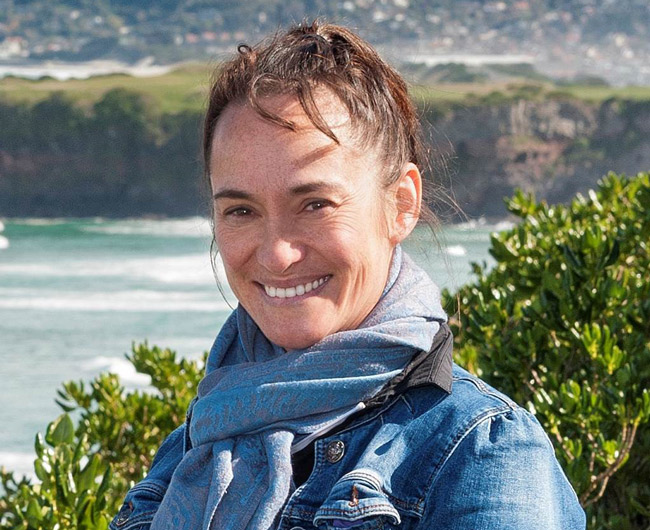
Merata Kawharu, one of 23 Otago academics being promoted to the position of Professor.
Being promoted to Professor is reflective of a journey many people have been a part of, says Merata Kawharu.
Associate Professor Kawharu is one of 23 academics promoted to the position of Professor across Otago's Dunedin, Christchurch and Wellington campuses, taking effect from 1 February 2018; a further 41 academics are being promoted to Associate Professor level.
“I'm very happy to reach this step in my career, but it's much more than that too,” she says. “It's reflective of a journey that many people have been part of – community and iwi leaders, academic leaders and of course the two people who guided me all the way to where I am now; my parents.”
For Associate Professor Kawharu, the step to professorship wasn't one she wanted to make until she felt she had made a useful contribution to Māori community development, or to indigenous anthropology.
Without a doubt she has now done that.
"I think Māori research professors are a rare breed, but we have so many complex and challenging social, economic and environmental issues to address, so we need deepen Māori research excellence in all areas."
A former Rhodes Scholar who studied social anthropology, Associate Professor Kawharu has dedicated her academic life to addressing issues such as social and economic innovation in Māori communities and Treaty claim settlements. She has also written extensively on cultural knowledge and marae, and worked on national boards and with the UN, UNESCO and leaders in world heritage.
Associate Professor Kawharu has won various awards for her publications and community work, including the MNZM for services to Māori education. More recently she has developed models of entrepreneurship along with Professor Paul Tapsell.
She feels privileged to be a role model for emerging Māori scholars, showing them that they too can lead research and get to this level.
“I think Māori research professors are a rare breed, but we have so many complex and challenging social, economic and environmental issues to address, so we need to deepen Māori research excellence in all areas.”
She says there is still plenty to be done, further exploring successful models of social and economic growth in communities.
“We need to also critically ask what kinds of leadership are needed to pursue growth agendas, whether these leadership roles are in our marae, in our land trusts, in our post-Treaty settlement entities, in our homes or in our communities more generally.
"The individuals involved have earned these promotions through their hard work, dedication and proven excellence during their time as academics with us."
“There are also plenty of opportunities for universities to work closely with Māori communities to develop science and research programmes and to also nurture postgraduate students so that in time they too can lead research programmes and contribute to improving the health of people, communities and our environment.”
Announcing the promotions last week, Vice-Chancellor Professor Harlene Hayne warmly congratulated the new professors.
“The individuals involved have earned these promotions through their hard work, dedication and proven excellence during their time as academics with us. Their promotion underscores the very high quality of their leadership, the esteem in which they and their work is held, and the breadth of the academic talent and ability at the University of Otago as a whole.”
“I look forward to following with interest the very fine work they will produce in their new positions in the future.”
She says Otago's rigorous promotion processes involve thorough evaluation of each individual's record of contributions to research, teaching, and service to the University and community. The selection procedure also includes advice from international experts in evaluating the candidates' research contributions.
Staff promoted to Professor:
Haxby Abbott (Surgical Sciences, Dunedin School of Medicine)
Greg Anderson (Anatomy and Centre for Neuroendocrinology)
David Bell (College of Education)
Jim Cotter (School of Physical Education, Sport and Exercise Sciences)
Sarah Derrett (Preventive and Social Medicine, Dunedin School of Medicine)
George Dias (Anatomy)
Ruth Empson (Physiology)
Ruth Fitzgerald (Anthropology and Archaeology)
Paul Hansen (Economics)
John Horwood (Psychological Medicine, Christchurch campus)
Greg Jones (Surgical Sciences, Dunedin School of Medicine)
Merata Kawharu (Te Tumu: School of Māori, Pacific and Indigenous Studies)
Stephen Knowles (Economics)
James Maclaurin (Philosophy)
Patrick Manning (Medicine, Dunedin School of Medicine)
Jessica Palmer (Faculty of Law)
Suetonia Palmer (Medicine, Christchurch campus)
Inguruwatt Premachandra (Accountancy and Finance)
Anthony Ritchie (Music, Theatre and Performing Arts)
Louise Signal (Public Health, Wellington campus)
Claudine Stirling (Chemistry)
Michelle Thompson-Fawcett (Geography)
Sarah Young (Pathology, Dunedin School of Medicine)Staff promoted to Associate Professor:
Azam Ali (Centre for Materials Science and Technology)
John Ashton (Pharmacology and Toxicology)
Alaa Bekhit (Food Science)
Rebecca Campbell (Physiology)
Ben Daniel Motidyang (Higher Education Development Centre)
Fiona Edgar (Management)
David Eyers (Computer Science)
Sebastian Filep (Tourism)
Alex Gunn (College of Education)
Hilary Halba (Music, Theatre and Performing Arts)
Sian Halcrow (Anatomy)
James Headley (Politics)
Janice Lord (Botany)
Nigel Lucas (Chemistry)
Liana Machado (Psychology)
Sandra Mandic (Physical Education)
Simone Marshall (English)
Christoph Matthaei (Zoology)
Lynn McBain (Primary Health Care & General Practice, Wellington campus)
Giles Newton-Howes (Psychological Medicine, Wellington campus)
David Orlovich (Botany)
Bruce Russell (Microbiology and Immunology)
Mike Sam (Physical Education)
Ben Schonthal (Theology and Religion)
Daryl Schwenke (Physiology)
Philippa Seaton (Postgraduate Nursing, Christchurch campus)
Sally Shaw (Physical Education)
Trent Smith (Economics)
Lee Thompson (Population Health, Christchurch campus)
Steve Tumilty (Physiotherapy)
Dr Tony Walls (Pathology, Christchurch campus)
Sigurd Wilbanks (Biochemistry)
Hamish Wilson (Medical School)
Ming Zhang (Anatomy)Research Associate Professors:
Anitra Carr (Pathology, Christchurch campus)
Dawn Coates (Oral and Diagnostic and Surgical Sciences)
Margaret Currie (Pathology, Christchurch campus)
Michelle McConnell (Microbiology and Immunology)
John Pearson (Dean's Department, Christchurch campus)
Nevil Pierse (Public Health, Wellington campus)
Janet Stephenson (Geography)Clinical Associate Professor:
Darren Hooks (Medicine, Wellington campus)